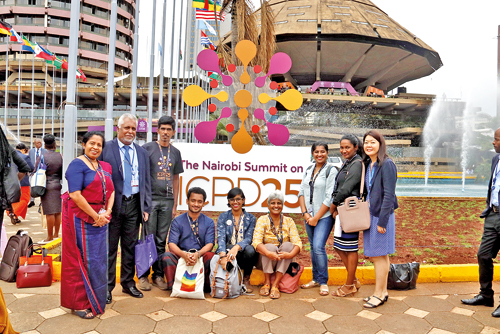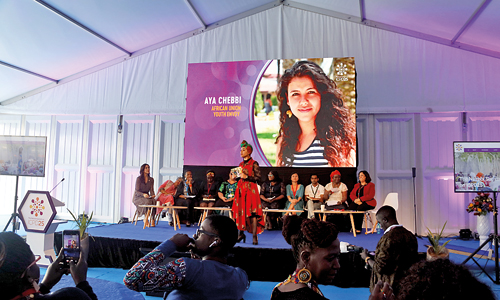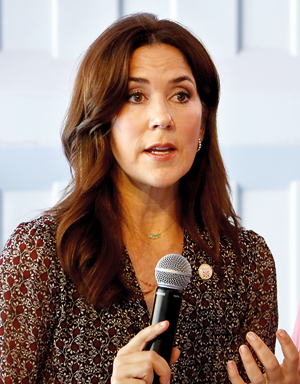Young voices speak up for change
Day 1 of the Nairobi Summit and the International Conference on Population & Development is underway. The Summit, co-convened by the governments of Kenya and Denmark with UNFPA, the United Nations sexual and reproductive health agency is at the centre of much debate. Outside the conference venue, conservative religious groups are distributing pamphlets condemning the conference and the dialogue on sexual and reproductive rights it represents.

The Sri Lanka delegation
Inside, it feels like the panels are picking up a kind of momentum – the one on intergenerational dialogue is crowded with women from different generations, and is electric with energy. Delegates speak of a global climate where sexual and reproductive rights are being threatened, and in some cases, even rolled back. Here, however, is a gathering determined to push back, who in fact, have been pushing back for decades.
Young people push for change
This intergenerational dialogue brings together women who were there at that first conference, and a new generation of young activists – at least one of whom was born years after Cairo. Moderated by Mary, Crown Princess of Denmark and Aya Chebbi, the first African Union Youth Envoy, the panel plays out to a crowded room.
It’s been 25 years since the Cairo Summit, which advocates agree represented a profound shift in how sexual and reproductive health rights were framed by nations around the world; a critical development was how the focus shifted from being a numbers game to advocating for women’s empowerment. Contraception and family planning were seen as vital services that allowed parents to choose whether and how many children to have, and how to space them out. Participants also left with a broader understanding of how demographics could feed into development efforts.
Sri Lanka sent a delegation to that first conference and the commitments the country made then had far-reaching implications for the island, feeding into the creation of a comprehensive, progressive new sexual and reproductive health policy. The formulation of the Population and Reproductive Health Policy in 1998 and the subsequent development of an Action Plan based on the policy were important initiatives.
Now, some 9,500 delegates have gathered in Nairobi. The commitments presented by governments here, including Sri Lanka’s, will be non-binding, but they are meant to address the most urgent needs of women and girls. However, at the intergenerational dialogue, it’s clear that a young generation of activists are tired of waiting for the promises of ICPD Cairo to be realised.
“25 years later, yes, there was progress, but it has been very slow. That’s what our generation says. It is not up to the expectation of the 21st Century, it is not up to the expectation of 2019 and 2020,” says Aya in response to a panelist who outlined the achievements of that first conference. “That is why we need to create an intergenerational movement.”
Aya introduces the first panelist. Emmanuella Zandi Muderhwa holds nothing back, sharing her story of how she was assaulted for the first time when she was seven years old, raped multiple times by two men. After she stumbled home, it took several hours for her family to travel to the nearest hospital and two months before she had healed. A few years later, at age 13, she was raped again. This time in her own family home, by a cousin who lived with them.
The rapes themselves were made worse by what came after. “I lost family, I lost friends. No one would talk to me because they said, ‘You are a raped woman.’” As a young woman, Emmanuella struggled with depression and tried to kill herself. However, somewhere along the way she decided to fight. “The deeper I went into pain, the higher my courage rose,” she said, speaking into pin-drop silence.
Emmanuella would go on to found “Ma Voisine” (My neighbour) and today helps other young survivors of violence. For her, bolstering the health system, so that it not only offers the treatment needed but also provides mental healthcare is a priority.

Young activists at the conference: Aya Chebbi, the first African Union Youth Envoy, the panel (above) and (below left) Crown Princess Mary of Denmark
At ICPD today, Emmanuella’s courage acts as a kind of foundation for the panel, demonstrating clearly the need for greater commitment to the sexual and reproductive health of girls and women, underlining why these young advocates are convinced that these issues have not received the attention they deserve.
Asked for her reaction to Emmanuella’s story, Princess Mary struggles to find the words. “It’s actually difficult to find a reaction,” she admits, “I want to say I am sorry, but sorry is never going to be enough. I want to say thank you for putting a face on the statistics…Because this is about human rights, it’s about people, it’s about you and it’s about me, and it’s about all of us. And you can have confirmed for me once again that women are not weak, they are just the subject of inequality.”
Other panelists highlight the need for greater political representation for young women, the absolute criticality of ensuring there is funding to implement these ambitious policies, the interlinked nature of social, cultural and economic challenges that need to be addressed, alongside the importance of making room at the table for people with disabilities and sexual minorities, ensuring, in essence, that no one is left behind.
Comprehensive Sexual Education vital for development
24-year-old Shelani Palihawadana, a Project Coordinator at the Youth Advocacy Network in Sri Lanka is soaking it all in. As someone who has worked closely with youth and adolescents with disabilities, Shelani is convinced of the need for greater and more equitable access to sexual and reproductive health care for young Sri Lankans across the board. “We need to give more importance to CSE (Comprehensive Sexual Education) in Sri Lanka,” she says, explaining that to her mind it is key.
 21-year-old Desaree Soysa, Chairperson of the Family Planning Association’s Youth Technical Advisory Committee agrees whole heartedly. “The main themes of this conference are really population and development, and we all agree that human capital is the main resource of a country,” says Desaree. “One of the best ways to improve human capital is through providing CSE.”
21-year-old Desaree Soysa, Chairperson of the Family Planning Association’s Youth Technical Advisory Committee agrees whole heartedly. “The main themes of this conference are really population and development, and we all agree that human capital is the main resource of a country,” says Desaree. “One of the best ways to improve human capital is through providing CSE.”
Desaree is convinced as well that educating boys and men about sexual and reproductive issues will reduce the epidemic of gender based violence in Sri Lanka and bring more women into the workplace by addressing the traditions and stereotypes that keep them at home, and challenging the sexual harassment that is so common on public transport and in the workplace.
Tangible investments in SRHR
As the youngest Sri Lankan delegates at ICPD in Nairobi, the two young women join Dr.Chithramalee de Silva, Director Maternal and Child Health at the Ministry of Health as she goes on stage to read out Sri Lanka’s commitments. The country begins by promising to strive for a clear target of reducing the maternal mortality ratios in Sri Lanka to meet the SDG goals of 20 per 100,000 by 2030, as well as meeting the unmet need for family planning which accounts for 20% of maternal deaths. Also in the commitments is the promise of a national budget line especially formulated to provision reproductive health.
After the nine commitments are read, Dr. Chithramalee speaks to the crowded assembly hall, concluding: “Sri Lanka is fully aware of the potential of women and youth to harness in sustainable development and strongly committed to get their contribution to the country’s economic and political decision making process.”
Outside the hall, Dr.Chithramalee reiterates this message, speaking exclusively to the Sunday Times. She points to the Ministry of Health’s national strategy on adolescents and youth health and says there is a strong focus on sexual and reproductive health as well as on the mental wellbeing of young people. Child abuse, child marriages and teenage pregnancies also present challenges today and require coordination between multiple stakeholders, including the Ministry of Youth Affairs, the Ministry of Education as well as social services, says Dr. Chithramalee, adding that they intend to push for young people to engage and to adapt their policies based on what Sri Lanka’s youth want. Critically, politicians will have to start listening, and commit national resources to these pressing issues.
At the Summit the price tag for global change has been made clear. New research indicates that the cost of achieving the “three transformative results” – zero maternal deaths, zero unmet need for family planning, and zerogender-based violence and harmful practices –within the next decade would be $264 billion.Without this investment in gender equality, the Sustainable Development Goals will remain a distant dream.
Going forward, the United Nations Deputy Secretary-General Amina Mohammed tells the gathering in Nairobi, countries will have to start investing or risk falling behind. “The bold, rights-based vision of the ICPD – that development must put people first, that access to health, education and human dignity must be equal for all persons – informed the bold vision of the 2030 Agenda,” she says. “As accelerators for the Sustainable Development Goals, the outcomes of the Programme of Action must be carried forward. Our common framework for people, planet, prosperity, peace and partnership depends on it.”
Ms. Ritsu Nacken, UNFPA Country Representative in Sri Lanka, says "The Nairobi Summit was another groundbreaking conference for the population and development discourse, which clearly demonstrated the principle of inclusivity. Young people were at the center of the discussion; and the message from youth was clear: 'Nothing about us, without us'. I felt privileged to have the opportunity to support the Sri Lankan delegation, which delivered an ambitious yet reachable commitment for the betterment of women and young people's health and wellbeing in Sri Lanka. The real work starts now. The Nairobi Summit is not the end, but the beginning of the renewed efforts for rights and choices for all."


